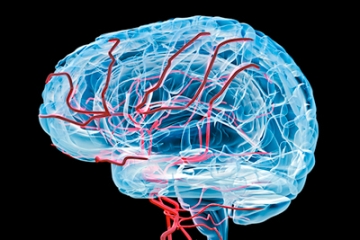March 21, 2024
A blood clotting protein found in young mice may reduce inflammation and improve cognition in older mice, according to an NIA-funded study. These findings, published in Nature, suggest that the protein platelet factor 4 (PF4) has the therapeutic potential to rejuvenate the brain by reversing the effects of aging on the body’s immune system.

Several studies have shown that blood from young mice may reduce or reverse the effects of aging in the brains of older mice. In this study, a team of scientists from the University of California, San Francisco; Stanford University School of Medicine; and Duke University searched for the proteins in young blood that may play a key role in these effects.
The researchers collected blood from young mice and isolated cell-free portions known as platelets and plasma. Plasma contains a variety of free-floating biochemicals as well as platelets, which are cell fragments that contain proteins important for blood clotting.
Initial experiments showed that both plasma and platelets may reverse some of the effects of aging on mice brains. Specifically, the genetic activity of cells in the hippocampus, an area of the brain that is often damaged by dementia, suggested that both blood components reduced age-related inflammation and strengthened communication between neurons. Moreover, the blood components improved the mice’s performance on a variety of memory tests. For example, older mice treated with the components could remember the location of a platform hidden underwater better than those that received saline.
Further experiments suggested that the protein PF4 plays a key role in these effects. The researchers found that PF4 levels were elevated in the blood plasma of young mice and that treating older mice with PF4 reduced brain inflammation and improved synaptic plasticity, the cellular mechanism behind memory formation and learning. Older mice treated with PF4 also performed better on several memory and cognition tests compared to older mice that received the placebo.
Notably, injections of a luminescent tagged version of PF4 appeared in the blood and livers of older mice but not in their brains. The researchers also found that PF4 treatment reduced the levels of aging-related inflammatory proteins in the blood of older mice. These results suggest that PF4 works indirectly — via the blood — to rejuvenate the brains of older mice.
This study shows that the platelet factor PF4 may be a useful drug target to reduce age-related inflammation and improve cognition in older individuals. Future research may test whether PF4 can improve cognition in mouse models of neurodegenerative disease. Overall, the findings support the therapeutic potential of PF4 or related drugs to counteract the effects of aging on the brain and immune system.
This research was supported in part by NIA grants AG064823, AG081038, AG077816, and AG067740.
Reference: Schroer AB, et al. Platelet factors attenuate inflammation and rescue cognition in ageing. Nature. 2023;620(7976):1071-1079. doi: 10.1038/s41586-023-06436-3.